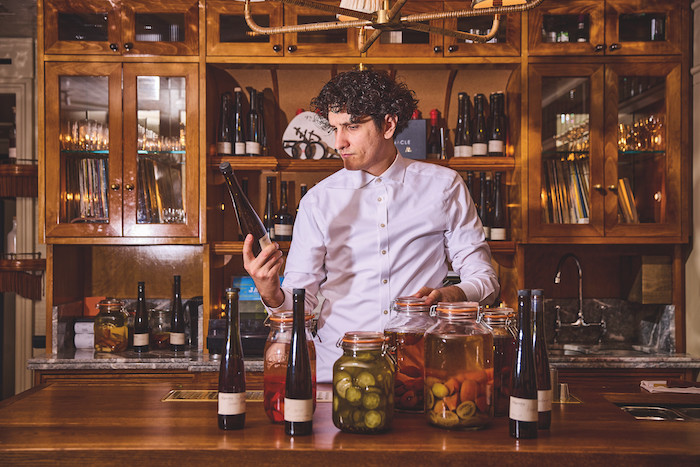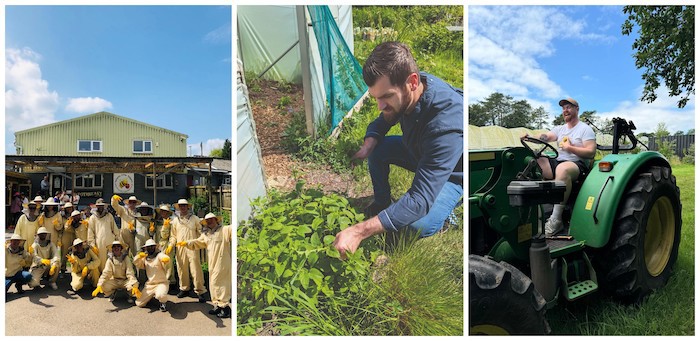
Hyper-localism isn't anything new, it's a return to how things always used to be. Ellen Manning fixes her compass to bars in all corners of Britain to see how they are finding delicious produce closer to home.
Exotic ingredients and cocktails go hand in hand. How many times have you sipped a drink flavoured with spirits from across the globe, garnished with fruit from far-flung places? But times are changing. Hyperlocal is the watchword for everything, from news articles to food and drink sourcing. With sustainability on everyone’s minds, not to mention growing issues (and likely more on the horizon) when it comes to shipping ingredients across the world, finding ingredients right on your doorstep is key.
“Using hyperlocal ingredients isn’t just a trend, it’s a return to doing things properly,” says Khris Mclaren, bar manager at Cornwall’s Ugly Butterfly, where ingredients are foraged from the coast on its doorstep, or sourced from local suppliers. “When fruit, herbs and veg are grown close by, they’re picked at their best, often just hours or days before we use them. That means more vibrant flavours, fresher aromas and a natural connection to the time of year and the local environment.”
It’s not always easy, of course. Owners will admit there’s extra work and sometimes cost associated with seeking out local equivalents to some of the produce we’re used to seeing shipped in cheap. “Every bar has the potential to do a bit,” says Lab 22’s Max Hayward, “but not necessarily as much as we're doing. Essentially, you’re often paying more for ingredients, and on a financial business basis that's not necessarily feasible for everyone.”
But while it may not be the easiest path to follow, some of Britain’s best bars are taking on the challenge and using fresh produce grown or foraged on their doorstep to stand and add a true sense of place to their creations.
South west – Ugly Butterfly
With a reputation as a beacon of zero waste and sustainability, Ugly Butterfly’s sourcing of ingredients from its Cornish doorstep – from wild botanicals on the coast to small-scale growers – is part of its identity.
“When you build cocktails around these ingredients, it gives each drink a story and a real sense of place,” explains Mclaren. “It’s more personal, more sustainable and more exciting. We definitely let the ingredients guide us, so rather than forcing ingredients into a set menu, we’ll adapt our drinks to highlight what’s in season at the time.”
That means building a cocktail around strawberries from Trevaskis Farm in summer, or foraged wild elderflower, then leaning into orchard fruits, smoked herbs or sea buckthorn in autumn. “We’re very lucky to be able to work directly with some brilliant local growers and small-scale producers, so we get the freshest possible ingredients and can build relationships with the people behind the produce, like Curgurrell Farm on the Roseland Peninsula where we get a lot of our citrus from,” he adds.
The north of England – PAL PAL prides itself on focusing on localism, with Lewis Parry previously telling Class about efforts to stock only local products, including homemade and homegrown produce. The result means the menu is in constant flux, depending on what’s available, but it also means classic cocktails are recreated through the lens of British produce – not only hitting the mark in terms of sustainability, but also creating drinks that reflect what’s available on the bar’s Grimsby doorstep. Think Yorkshire rhubarb juice, gin created using locally sourced redcurrants and more, with a side order of shoutouts to businesses such as local Lincolnshire-based produce supplier Taylors Fruit & Veg.

Scotland – Gleneagles
With the riches of Scotland all around, The American Bar at Gleneagles has a plethora of botanical bounty just outside the front door. Inspired by the Rose Annuals, published since 1876, its menu showcases rose-based ingredients, half of which come from Gleneagles’ own ecosystems, such as roses grown on the estate, and the others using Scottish flora from the landscape around it. The latest menu, The Rose Compendium, celebrates elements from the estate often foraged by the team themselves. Add to that Scottish flora and ingredients provided by local producers, locally sourced fruits like quince and blackberries, and the bar ties itself inextricably to the landscape it sits in.
Wales – Lab 22
At Cardiff’s Lab 22 (pictured above) the drinks on the most recent menu, dubbed ACT – a celebration of their principles of accessibility, community and transparency – all feature a collaboration with a local business, from a vessel by a local potter to produce including honey from local beekeepers, Welsh green tea and rose hips hunted down by a local forager. Such a move isn’t always easy, requiring commitment in finding the right produce, but it’s worth it, says Hayward. “It’s really rewarding. Yes, we’ve taken a slight hit to make sure we’re supporting these people on this menu, but the way we look at it is that the benefits we get are worth it, from the drinks being better to the guest experience being better, and what we’re doing to our community. It gives you a sense of place as a bar and an identity. We’re the only bar where you can come and have a drink made with Welsh green tea, for example.”
London – Nipperkin
Nipperkin (pictured - top) is all about showcasing the best of British produce, putting hyperlocal, as well as hyper-seasonal, at the heart of its menus, sourcing produce from the British Isles. In the past, citrus has been substituted for homemade fermented elderflower tea and verjus from a producer in Sussex, while its ‘lean season’ menu, launched in January, even sourced Japanese ingredients from the UK, such as wasabi from West Dorset and sansho peppers grown in Essex – proof that hyperlocal doesn’t have to always mean stereotypical British ingredients. The ‘lean season’ menu featured Heritage Radishes & Koji made with radishes from Herefordshire and shiso leaves grown in Norfolk, while non-alcoholic options included Norfolk Mint & Shisho, again showcasing ingredients just hours from the Mayfair bar.
A more authentic story
The motivation for bars to embrace hyperlocal produce may feel slightly worthy to some, but the consensus is that it’s a win-win – not only showing that they’re taking sustainability seriously, but allowing them to feel the benefits too. Mclaren sums it up: “Bars should absolutely be thinking more regionally. It makes sense financially and environmentally, enhancing the flavours and guest experience at the same time. It also keeps menus fresh and dynamic and helps tell a more authentic story. In a world that’s full of cookie-cutter cocktail lists, working locally is a way to stand out and to do some good along the way.”


